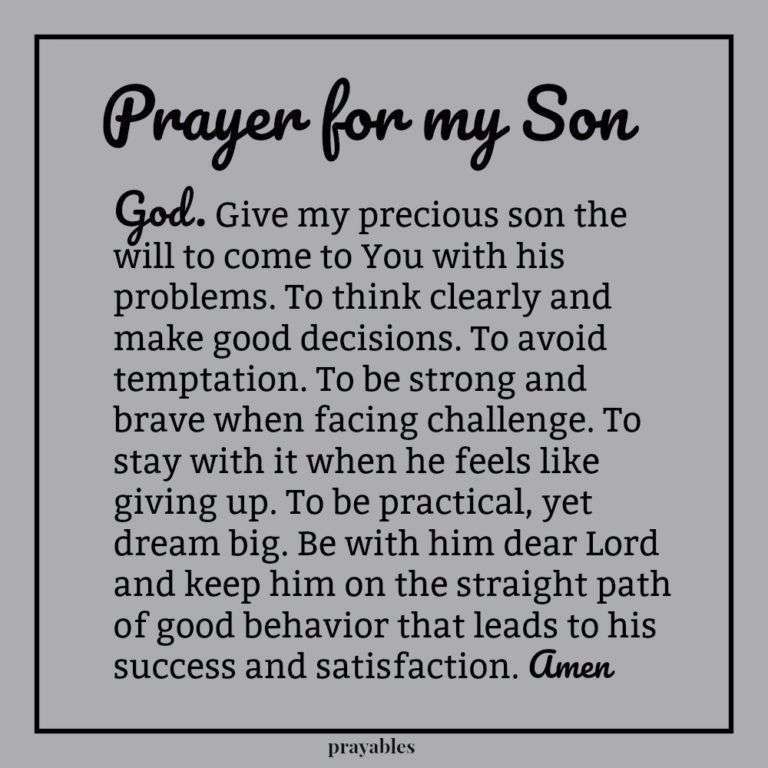Blessings and Prayers for New Parents
Whether you’re newly pregnant or just embarking on the exciting journey of parenthood, there are bound to be plenty of changes happening in your life. From the big things like a new home and a new job to the small things like hormonal fluctuations, it can be tough keeping up. And that’s where prayer comes in. Prayer not only provides comfort and support, but it can also help you deal with the challenges head-on. Whether you’re asking for guidance during pregnancy or throughout the newborn stage, take advantage of the blessings and prayers that come your way.
Blessing the New Parents
As a new parent, you are probably feeling overwhelmed with all the changes and challenges that come along with this amazing journey. It’s natural to feel a lot of gratitude for your healthy child, but don’t forget to give thanks to the people who helped make this happen – your adoptive or birth parents. Here are some blessings and prayers for new parents:
-May you have peace and love in abundance as you nurture your new little one.
-Please keep them safe and healthy during these early months.
-Help them to grow into confident and happy adults.
-Grant them wisdom as they navigate this uncharted territory.
-Fill their lives with happiness, love, laughter, and joy.
Prayers for New Parents
Prayers for New Parents
There is no one right way to pray when celebrating the arrival of a new baby. Whether you are Catholic, Protestant, Jewish, Hindu, or any other religion, there are plenty of prayers that can be offered in thanks for your new addition. Here is a sampling to get you started:
Dear God,
We thank You for this new life within our family. We ask that You would bless both the mother and child and keep them safe during their journey.
In Jesus’ Name we pray. Amen
Tips for New Parents
Blessings and Prayers for New Parents
Congratulations on becoming parents! Here are some tips for new parents:
1. Get organized. Make sure to have all the necessary paperwork, diapers, wipes, bottles, and other supplies ready before your baby arrives. You’ll be glad you did!
2. Get plenty of rest. This is especially important if you’re breastfeeding. Your body is going through a lot of changes and needs lots of rest to support your little one.
3. Eat well. Babies need plenty of nutrients to grow and develop properly. A good diet will help you both thrive!
4. Be patient with yourself and your baby. It can be tough adjusting to this big change, but remember that everything will get better in time!
When to Expect Your Baby
When to Expect Your Baby
There’s no one answer to this question, as everyone’s body and pregnancy journey is different. However, general guidelines for baby-birthing season include:
Most babies are born in the spring and fall (March-September in the Northern Hemisphere, and October-February in the Southern Hemisphere).
The average delivery time is around 37 weeks (4 months), but can range from 24 to 42 weeks.
What to Expect during labor and delivery
Pregnant women are often excited and filled with anticipation for the arrival of their baby. labor and delivery can be a physically and emotionally challenging experience, but with the support of family and friends, it can also be a rewarding one. Here are some things to expect during labor and delivery:
The first stage of labor is called dilation. This is when the cervix begins to thin and lengthen. The second stage is called effacement, which means the birth canal relaxes and opens wider. In the third stage, delivery may happen if no problems arise. The fourth stage is active Labor, when contractions become stronger and more frequent. The fifth stage is Delivery, when your baby emerges from your womb!
Some women find relief from pain medications in the early stages of labor. However, most women eventually need to rely on medication to manage pain. If you’re experiencing intense pain that’s not relieved by medication or rest, contact your doctor immediately.
Most babies arrive within 40 minutes of Labor starting, but it can take up to four hours for most babies to come into this world naturally without any intervention by doctors or nurses. If you’re experiencing prolonged labour or difficulty delivering your baby, contact your doctor immediately!
The First Year of Parenthood
The first year of parenting is an exciting and challenging time. There are so many new experiences to be had and theres never a dull moment when your little one is around. Here are some tips on how to make the most of your first year as a parent:
1) Be prepared for everything. This may sound like common sense, but you would be amazed at how many parents don’t actually prepare for everything their child might do. Make a list of all the things that could go wrong during your baby’s first year (including car accidents, illnesses, etc.) and have a plan in place to deal with each one. This will make all the difference in making sure your child has a happy and safe first year.
2) Have fun! One of the best ways to ensure a happy and healthy baby is to have lots of fun yourself. The more laughter the family has, the better off the baby will be. Make time for yourselves too – take naps, get out for walks, watch funny movies, etc. Spending time together as a family is really important during this special time.
3) Set realistic expectations for your child. It can be tough when you’re expecting something amazing from your little one only to have them disappoint you later on in life (we all know somebody who fits this description!). However, it’s important not to set unrealistically high expectations from the start – this will only frustrate you
How to Cope with Sadness and Grief
Dear new parents,
You’re going through a whirlwind of emotions as you prepare to become one of the lucky few to experience the miracle of childbirth. But don’t be surprised if your feelings turn to sadness and grief after your baby is born. Here are some tips on how to cope with these emotions:
1. Honor your feelings.cknowledge that you will feel sad and grieved at first, and allow yourself time to adjust. Don’t try to push through the tough times; they will pass.
2. Talk about it.Share your feelings with someone you trust, whether it’s a family member or friend. Talking about what’s going on can help take some of the pressure off and make the process easier for both you and your loved ones.
3. Find comfort in familiar things. Spending time with loved ones, reading a good book, taking a nature walk-these simple things can help take your mind off of what’s bothering you and provide some much-needed comfort.
4. Seek professional help if necessary.If dealing with sadness and grief feels overwhelming, consider seeking professional counseling or therapy to help guide you through these difficult times.[/subheading]
How to Raise a Happy, Healthy Child
Raising a happy, healthy child is one of the biggest blessings in life. Here are some tips for raising a happy and healthy child.
1. Get plenty of sleep. Sleep is essential for both parents and children. In fact, getting enough sleep can be more important than eating right or exercising for kids’ mental and physical health. Kids who get enough sleep grow taller, smarter, and have better concentration skills. They’re also less likely to experience behavioral problems, such as acting out or being ADHD.
2. Set boundaries with your children. Let them know when they cannot do something and why it’s not allowed. You don’t want them to feel like they need to tough it out all the time or that you’re always mad at them. It’s important to have clear rules in place so that everyone understands them and can adhere to them without argument or struggle.
3. Be patient with your children. Children often make mistakes and they will undoubtedly test your patience at times. Remember that even the smartest kids sometimes behave stupidly! Just keep calm and stick to your guns – eventually your child will learn that following rules gets them rewards (like spending time with you).
4. model healthy behavior yourself. Children copy what they see most frequently–and this includes both good habits (like eating well) and bad habits (like smoking cigarettes). So it’s important that you lead by example and make sure all of your behaviors are positive ones for your child






